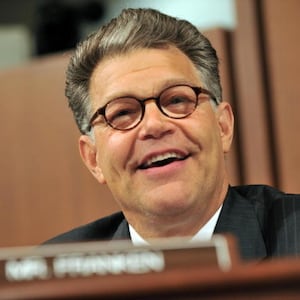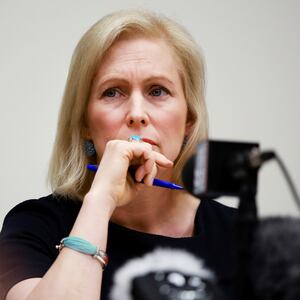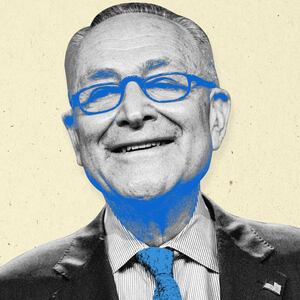In most blue states, Sen. Kirsten Gillibrand would probably cruise to re-election.
Since arriving in the Senate in 2008, Gillibrand has secured a staunchly progressive record and a reputation for advocacy on urgent issues important to Democrats: gun control, paid family leave, and violence against women.
But Gillibrand doesn’t represent just any blue state; she represents New York. And the Empire State is home to voters with sky-high expectations for their elected officials, not to mention tons of ambitious politicians with little compunction about challenging incumbents they perceive as vulnerable.
As Gillibrand kicks off her 2024 re-election bid, there’s an emerging sense among New York insiders that she may be vulnerable enough to invite a primary challenge from a fellow Democrat.
In the wake of her failed 2020 presidential campaign, Gillibrand has kept a lower profile, according to close political observers in Washington and in New York. Rumors persisted that she might leave office. Privately, Gillibrand had left colleagues with the impression she was thinking about not running again, though she has publicly said over the last year that she would run.
The senator has traded the high-profile pushes and media blitzes of her pre-2020 days with quiet wins on important issues, like sexual assault prevention in the military, guns, and expanding veteran health care.
Allies like Rep. Dan Goldman (D-NY) have called Gillibrand “one of the most effective legislators” in the Senate. In the ultimate congressional metric of nitty-gritty results, her office says she ranks in the top three percent of all members of Congress in terms of federal money steered back home, otherwise known as earmarks.
But some Democrats believe she has shrunk from the coveted platform afforded to the U.S. Senator from New York, a position that has traditionally been held by some of the party’s greatest liberal lions.
“The fact is, she is a diminished presence,” said Hank Sheinkopf, a longtime Democratic strategist in New York City, echoing the private sentiment of some party strategists. “One does not have to be a great soothsayer to look at the amount of press she’s not gotten… she’s not here, not around, absent.”
In a statement to The Daily Beast, Gillibrand spokesman Evan Lukaske said the senator is “confident New Yorkers will re-elect her and she’s excited to continue getting results for New York families.”
“From making gun trafficking a federal crime to securing health benefits for 9/11 survivors and our veterans to bringing home millions of dollars to boost the economy, Senator Gillibrand has delivered for the people of New York,” he said.
While it’s still early, some New York political consultants are increasingly convinced a primary challenge is inevitable, especially for an up-and-coming figure from the New York City area who can afford to take a gamble.
“I think it's pretty likely that she will have to spend some money on a primary race, in which, for lack of a better term, she does not have a very obvious constituency who is for her,” another Democratic strategist said, requesting anonymity to avoid involving any clients.
If a primary does happen, it’d likely be a bruising and pricey one—an affair that could frustrate Democrats as they attempt to hold the U.S. Senate majority against a brutal 2024 map. It would also exacerbate existing divisions among a New York Democratic apparatus that has been riven by infighting after a disastrous 2022 election.
Any serious challenger to the veteran senator would need to have “guts and a checkbook,” Sheinkopf said.
At the top of the list is Rep. Alexandria Ocasio-Cortez (D-N.Y.), who clearly possesses both. She has not commented on her 2024 plans, but some New York politicos think she would be a serious threat to Gillibrand. One even told The Daily Beast they’d bet on Ocasio-Cortez to win.
Meanwhile, former Rep. Mondaire Jones (D-N.Y.), a rising star in the party who lost his Hudson Valley congressional seat in the 2022 redistricting shuffle, has not ruled out a run against Gillibrand, according to a source familiar with his plans.
There are plenty of reasons why any challenger might opt out of challenging Gillibrand, however. For one, going against her would mean getting crosswise with the state’s political establishment. Gillibrand has the full support of Senate Majority Leader Chuck Schumer, Gov. Kathy Hochul, and key labor leaders, some of whom are warning any would-be Gillibrand primary foe to reconsider.
The senator also begins the election cycle with $5 million in the bank, and she’s getting started early on adding to that warchest. In March, Schumer is headlining a New York City fundraiser for her reelection campaign.
The main challenge to a successful primary is more fundamental. While Gillibrand sometimes gets unenthusiastic or disappointed reviews from Democrats, she has not really angered anyone or provided an obvious rationale for a challenge. That is a critical difference between her and two key New York leaders—Hochul and New York City Mayor Eric Adams—who seem to find new ways to infuriate progressives each day.
According to a Quinnipiac University poll from October 2022, 73 percent of Democratic voters in New York approved of Gillibrand’s job performance, with just 10 percent disapproving. Schumer scored 16 points higher, but the numbers show Gillibrand has more than solid standing within the primary electorate.
Timing is also on Gillibrand’s side. New York Democrats are licking their wounds after a disastrous 2022 election in the state that saw Republicans make historic gains, while progressives failed to knock out establishment-aligned candidates in primaries. Some operatives also note that potential challengers get far more out of being mentioned to run than actually running.
“The threat,” one Albany strategist said, “is sometimes even more valuable than being the candidate.”
Against that backdrop, some operatives believe Gillibrand simply won’t be an appealing target for Democratic organizers, donors, and voters who are more focused on pressuring Hochul and Adams, not to mention beating back an energized Empire State GOP. Although critical of Gillibrand, Sheinkopf told the New York Daily News last month that he thought the chances of Gillibrand losing a primary were “very small.”
In fact, Gillibrand seems to be preparing for a tough fight—but not from the left. While she would be strongly favored to beat a Republican in 2024, it is not out of the question that a talented GOP candidate could make it a competitive race.
One of the Democratic strategists who spoke with The Daily Beast pointed to some of Gillibrand’s recent legislative announcements and fundraising tactics as smart moves to neutralize potential rivals like Rep. Nicole Malliotakis (R-N.Y.) or former Rep. Lee Zeldin, who mounted a spirited campaign against Hochul last year.
Last December, Gillibrand teamed up with Malliotakis to push for state funding for a carpool lane on a Staten Island highway. She’s also fundraised off Zeldin by warning donors the former Long Island congressman “very nearly” beat Hochul. Zeldin has not ruled out a Senate bid but has publicly taunted Gillibrand for mentioning him, suggesting it means she’s worried about a GOP challenge.
While one of the Democratic strategists who spoke to the Daily Beast said Gillibrand has “no real ability to prevent a lot of primary challenges,” they acknowledge she has been left in a tough spot, particularly in Schumer’s shadow. Compared to the senior senator, Gillibrand has put in far less facetime in New York City and far fewer “deliverables” for progressives, as the strategist put it.
Gillibrand does not appear to keep a notably light schedule in New York. In the last year, she did a public town hall in each of New York City’s five boroughs, for instance.
But the perception that Gillibrand has been absent is at least partially fueled by Schumer’s famed capacity to get in front of seemingly any crowd—or TV camera—in the entire state of New York.
“That’s the answer right there: Chuck Schumer is ubiquitous,” Siena College pollster Steven Greenberg told The Daily Beast. “And every year since 1998, he has traveled to all 62 counties in the state of New York. Gillibrand doesn’t have that kind of presence. She doesn’t do a lot of events in the state.”
Still, not even Schumer’s near-comical presence in New York, nor his strategic courting of the left, could quell incessant chatter about a potential primary when he was up for reelection in 2022. No challenger ultimately materialized, after some methodical work from Schumer.
In her 2018 reelection, Gillibrand did not even face a nominal primary challenge, and dispatched a weak Republican candidate by 33 points.
Shortly after that victory, Gillibrand mounted an unapologetically progressive campaign for the White House. She repudiated the pro-gun positions she held as a centrist House member and called for the dissolution of the Immigration and Customs Enforcement agency—while issuing a mea culpa for her past anti-immigration stances.
Gillibrand failed to find traction, and in August 2019, she became the first of the seven U.S. Senators running in the Democratic primary to drop out of the race.
Political observers have noticed a shift in Gillibrand in the years since, from the would-be leader of the anti-Trump resistance who announced her 2020 campaign outside Trump Tower to a behind-the-scenes Capitol Hill player.
In recent years, Gillibrand has dug in on less high-profile legislative priorities, particularly with respect to the armed services. Last year, she secured long-awaited improvements to the military’s justice system for victims of sexual assault, and was a leader in the push to expand health care for servicemembers exposed to toxic burn pits.
When Congress passed the first bipartisan gun reform legislation in decades last year, Gillibrand’s proposal to criminalize gun trafficking was included, capping a years-long fight for her.
Recent local coverage of the senator has emphasized her new branding as a quiet but effective lawmaker. “You might have missed it, but Kirsten Gillibrand is at the top of her game” declared the headline of a 2022 profile of the senator from the New York outlet City & State, arguing she “specializes in relentless productivity behind the scenes.”
During two years of Democratic control of Washington, however, Gillibrand fell short in what was perhaps her most high-profile policy push: expanding family paid leave.
The New York senator led negotiations on the issue as Democrats crafted their social spending package, but ultimately, she and fellow Democrats could not persuade Sen. Joe Manchin (D-WV) to get on board with their proposals. According to Axios, Gillibrand alienated colleagues after it was revealed she had given their private phone numbers to Meghan Markle. The ex-British royal and paid leave advocate called surprised senators to push them on the issue.
As she gets back on the campaign trail, Gillibrand will have to reintroduce herself somewhat to New York voters. Amid her otherwise strong results in the October poll from Quinnipiac, 19 percent of voters said they didn’t know enough about her or had no opinion of her performance. That amount is vastly higher than the three percent who said the same for Schumer, or the five percent for Hochul.
“If she has a real challenger, she’s going to have to fight to reestablish herself and reintroduce herself,” Sheinkopf said. “Because people don't know.”











